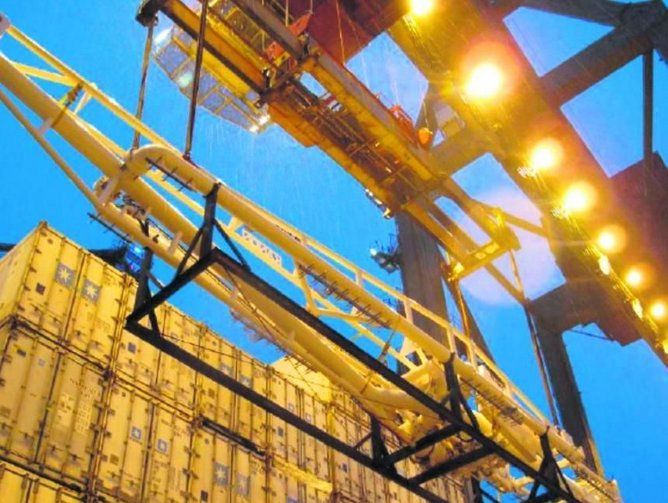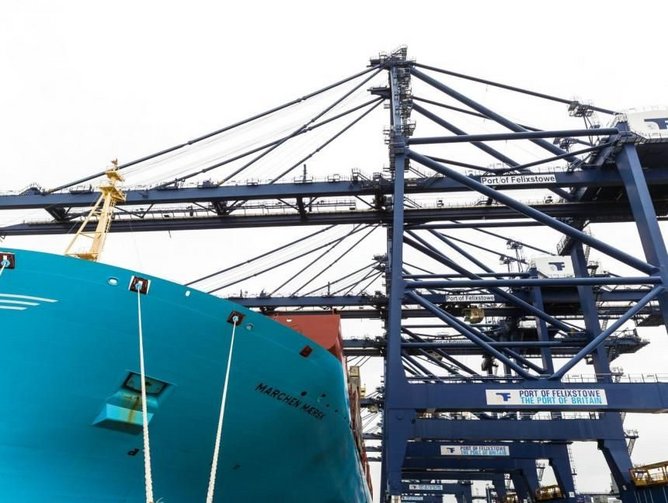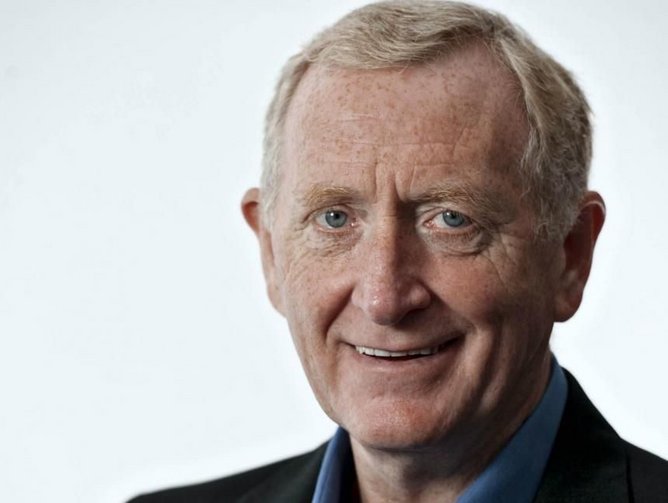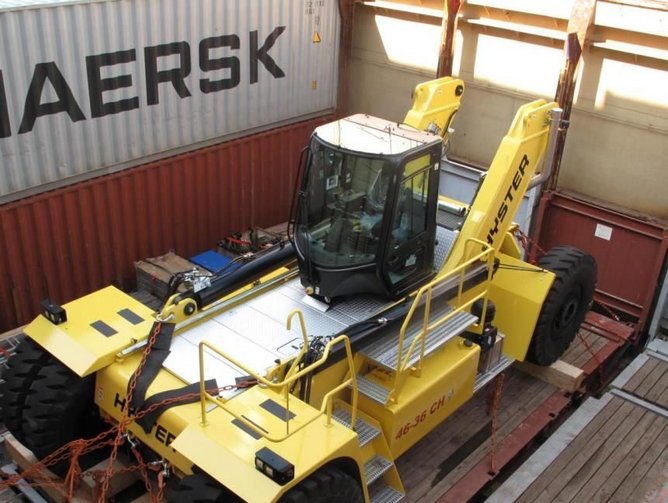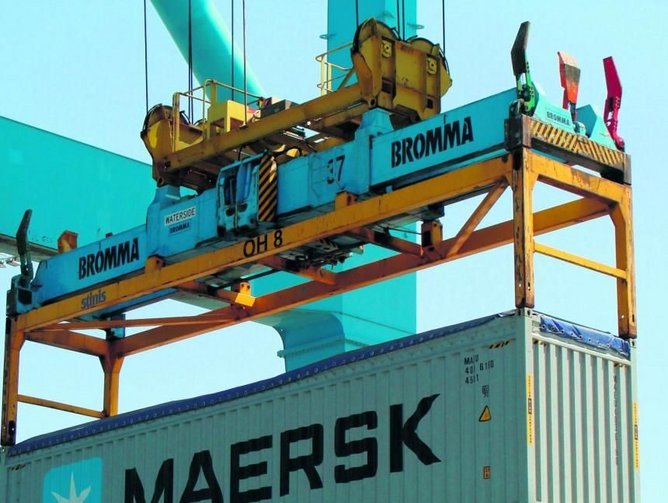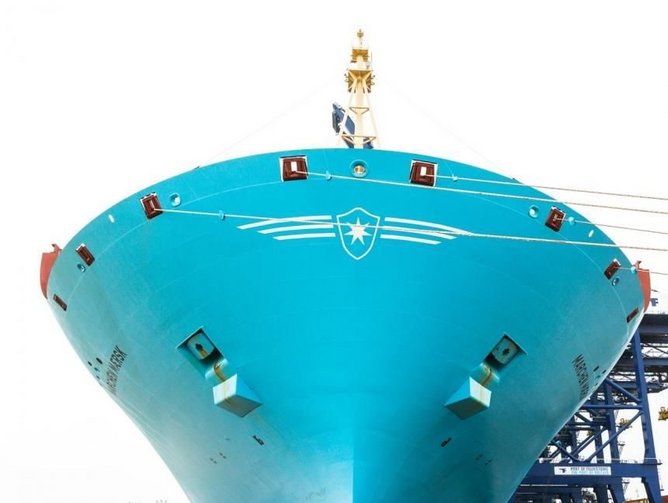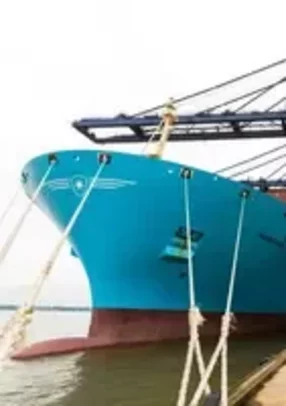Maersk Line UK & Ireland evolving to assist the modern customer
Maersk Line, one of the world’s leading container shipping companies, is ensuring it maintains its position as an enabler of trade by investing in its fleet and developing the ecommerce side of its business.
Having only started operating out of Great Britain in the 1980s (everything being previously coordinated from headquarters in Denmark) the UK & Ireland unit is still relatively young. Its first direct service from the UK began sailing in 1988, and today roughly 2,000 containers a day pass through British and Irish ports thanks to Maersk Line services.
Brian Godsafe, Managing Director of Maersk Line UK & Ireland, said: “With global trade the way it is, the main challenge is to fill the ships. The UK is generally two and a half to one in terms of imports and exports. If you’re a niche carrier you may be able to balance that out on one particular trade, but because we offer global coverage, that ratio applies to us, so we have to send back more empties than we receive when it comes to full containers.
“Apart from the imbalance, with the pound being so strong it means the exports get more expensive and that has put more pressure on the exporter. If you’re trading as a shipping company into the UK, you will have to accept that there is going to be an imbalance if you offer global services, that’s just the nature of the trade. You have to build the round-trip into the cost, that’s what all the carriers do. So hopefully you can build up a cost structure which covers both the full containers coming into the UK and part of the repositioning of getting the empty containers back out again.”
Godsafe pointed out that in the shipping industry, it is not like airlines or hotels when you can drop the price and hope to create the demand because dropping the price in shipping does not create a demand.
Fleet and ecommerce
The Maersk Group, of which Maersk Line is a part, famously owns an impressive range of Triple-Es; one of the largest shipping vessels in the world. These call into the Port of Felixstowe from the Far East. On top of this, Maersk Line recently placed an order for additional 14,000 TEU vessels.
Godsafe said: “We can actually put them on other trades because the other bigger ships can only be put at this moment in time on the Asia trade route. Not all ports can handle the size of a Triple-E you see, so 14,000 TEU vessels can give us a bit more flexibility and we can move them around depending on demand.
“So moving forward we will concentrate on buying the ships which are most economical. Usually, that means that the larger the size the more economical they are. However, often the bigger they are means they can also be less flexible. So I think our strategy going forward will be the same as we are now; we’ll get the most suitable ships, which means a mix of sizes to be honest.”
While there have been investments in assets such as the fleet, another area Maersk Line is focusing on in the UK & Ireland is ecommerce. Thanks to my.maerskline.com, its online cargo booking platform, the company is aiming to make it as easy as possible for customers to book, track and manage their cargo with Maersk Line. Godsafe envisages a time where shipping can one day be as easy as booking a flight to go on holiday, and although he appreciates it is a more complex business, the transactional side should be just as easy to navigate.
He said: “We don’t want to become faceless, but we want to spend our time in front of the customer on what they’re doing next, how they are developing and so on. What we’re really doing is facilitating business, we are the middleman transporting goods between buyer and seller.
“We want to develop systems and processes that makes it easier for our customer to do business with us. If we can sit down and talk to people about their business it gives us a greater understanding where we need to invest but hopefully we can then innovate together and come up with new ideas to see how we can help push businesses on.”
Customer charter
Underpinning the investment in ecommerce is the idea that customers should have the most modern, agreeable service Maersk Line can offer, backed up by a friendly website and positive user experience. An innovative way that the company is self-evaluating itself is through the Customer Charter, where through customer feedback, users have given Maersk Line eight areas the group should be measuring.
Over time this charter has been evolving through ongoing evaluation and feedback from stakeholders. The current eight measurements are: Invoicing, Booking confirmation, Accessibility, Documentation Accuracy and Amendments, Issue Resolution, Pre-Arrival Notification, Dispute Resolution and Customer Commitment. Godsafe said: “It’s taken us some time but we’re now at the point where we can actually produce the Customer Charter for individual customers and how these eight measurements will impact them specifically.
“In the world we live in that’s quite some step forward. These are items they have said they want measured, which was something the wider industry didn’t measure.”
Sustainability
Another example of helping customers to understand the impact of shipping on their business is Maersk Line’s efforts at being more sustainable. Container shipping, despite its significant impact on the environment, is also one of the more environmentally efficient methods of transportation, due to its economies of scale. One example can be the carbon footprint statistics in shipping. Aberdeen Angus beef sold in London can have a higher carbon footprint that that of Argentinian beef being shipped across. It’s a surprising fact, and many statistics like this are not displayed in the public forum. As such, these sustainability factors currently does not influence the customer’s purchasing decisions, but Godsafe believes it will do in the future.
Corporate social responsibility has always been important to Maersk Line, and that goes beyond purchasing the most economical vessels. It is also about what the firm can do to help the environment.
Over the past decade, Maersk Line has pushed the envelope for energy efficiency and CO2 reductions. Today, it has reduced its relative emissions by 40 percent and is on average more than 10 percent ahead of the rest of the industry according to global benchmarks. It has also set a bold new target to reduce carbon emissions per container moved by 60 percent by 2020 compared to levels from 2007.
As well as low impact shipping, the company also utilises rail freight up and down the length and breadth of the country. It is a vital component to multimodal transport of the containers, and Maersk Line attempts to use rail as much as possible thanks to the favourable cost and environmental considerations.
“We’re very involved in the movement in containers. We have bespoke arrangements with many of the retailers around getting their cargo straight to the Distribution Centres. We deal with all the major retailers …you name them, we’ve dealt with them.” said Godsafe.
Looking into the future aspirations of the UK & Ireland business unit, Godsafe reiterated that growth and revenue generally comes from the imports and not the exports, and that Britain is not producing much as a country anymore.
He said: “From what we ship out of this country, over 50 percent is scrap; waste paper and the like. If you take cars away, only 30 percent of our exports are manufactured goods from within the UK. I can’t see the export situation changing. We have to follow where the trade is actually improving or increasing. We’ve been doing that in China in recent years with their double digit growth but of course that is now slowing down.
“We want to be present in the developing areas. Just look in Asia where they’re losing some of the manufacturing business from mainland China to the likes of Vietnam, Cambodia and so on. If you look at an automotive company based in England like Nissan it’s an excellent example because it really has bucked the trend of a lot of manufacturers in the UK. It managed to internally keep the cost structure low and the productivity high. It is actually competing internally against Nissan companies in India and China and saying to its bosses we can produce different models of cars here in the UK.
“It has actually been getting brand new contracts and being given the manufacturing for the new Nissan Leaf electric car. It’s a great example of a good British manufacturer. So any success story like that we are hopeful to carry on being involved.”
So there you have it – through ecommerce, a sustainable approach to business and knowing where trade is developing, Maersk Line is well positioned to remain a crucial element of the supply chain for businesses shipping to or from the UK and Ireland.
